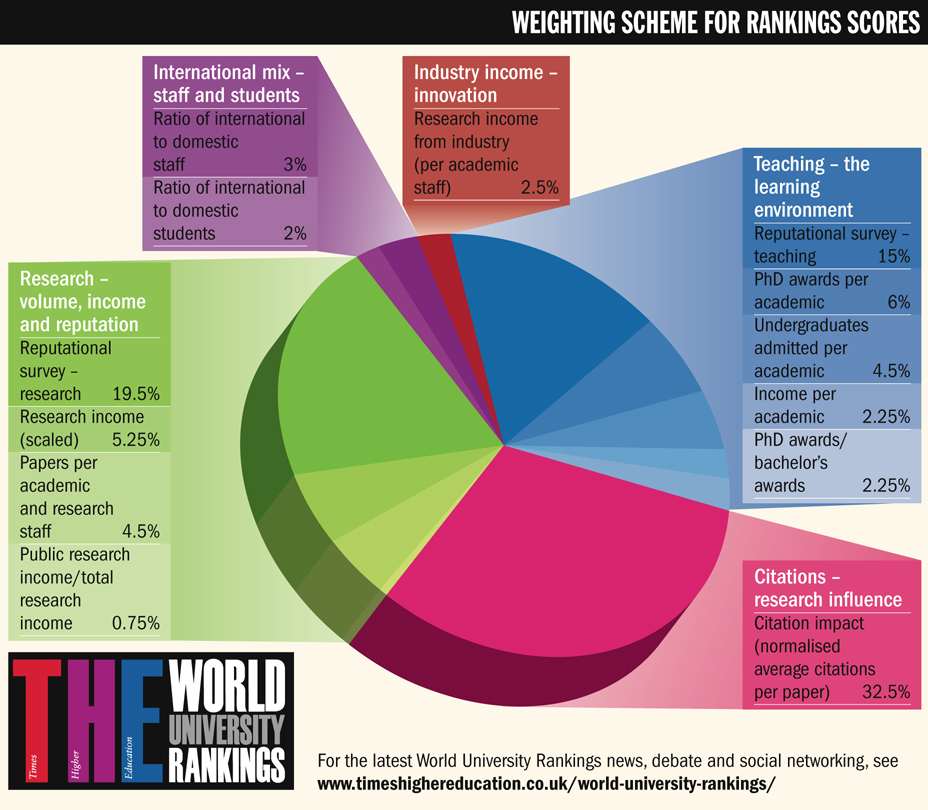Bilkent Ranked Best in Turkey and in Top 200 Universities Worldwide 
Bilkent University has been named by Times Higher Education as one of the top 200 universities in the world and the best university in Turkey. Bilkent ranks 112th worldwide and 32nd in Europe. In combined Europe and Asia rankings, Bilkent is 52nd over all. The only other Turkish university to be included in the top 200 is Middle East Technical University (METU) with a rank of 183.
Times Higher Education (THE) claims to be "the UK's most authoritative source of information about higher education." According to The New York Times and The Chronicle of Higher Education, THE's world ranking of universities has been one of the most influential factors in international education analysis and is routinely relied on by both private and governmental funding sources.
Using a system that assigns a score to 13 performance indicators under five subject categories: teaching, international mix, industry income, research, and citations, THE reaches an overall score. Bilkent scored 55.4, whereas the number one university, Harvard University, scored 96.1, and the number two, the California Institute of Technology, scored 96.0. METU scored 47.7.
This is the seventh year that THE has published its annual rankings, according to the THE website. But for 2010, THE has "completely overhauled the methodology" of building ranking in order to "represent the most accurate picture of global higher education [that they] have ever produced."
 Statistical skewing toward science and engineering excellence and away from art, humanities, and social sciences was a main reason for THE to change data analysis partners from Quacquarelli Symonds, Ltd. (QS) to the New York-based Thomson Reuters, which recently merged with the 158-year old Reuters reporting service and is the parent company of the ISI Web of Knowledge.
Statistical skewing toward science and engineering excellence and away from art, humanities, and social sciences was a main reason for THE to change data analysis partners from Quacquarelli Symonds, Ltd. (QS) to the New York-based Thomson Reuters, which recently merged with the 158-year old Reuters reporting service and is the parent company of the ISI Web of Knowledge.
Bilkent University rates its academic output with reference to the ISI Web of Knowledge. Bilkent's score in the "citations" category is 95.7, by far its best score.
Geoffrey Boulton, a well-respected professor at the University of Edinburgh, published an advice paper in June 2010 for the League of European Research Universities (an association of research-intensive universities sharing the values of high-quality teaching in an environment of internationally competitive research) titled "University Rankings: Diversity, Excellence and the European Initiative." Boulton concluded in June 2010, "None of the current ranking systems have the validity, rigour or meaning to be of real value, except those based on citations to evaluate research, and even here, they fall short in assessing research in the humanities and the social sciences."
An editor of the THE website echoed this concern: "One of the biggest problems with the old THE-QS methodology, which we will no longer use, is that the research excellence measure penalized the arts, humanities and social sciences. We are changing this. Because research excellence was previously based on a simple count of citations, those disciplines with higher citation levels, mainly in the hard sciences, were unfairly advantaged."
Phil Baty, editor of the THE world rankings, responded to questions by Aisha Labi in The Chronicle of Higher Education, "Times Higher Education is the only global ranking to devote a section to teaching. The new methodology is much more evidence-based and relies far less on subjective criteria than the old tables. But whereas teaching was previously measured based solely on student-staff ratio, the new rankings incorporate a reputational survey."
In the new formula, performance indicators are not weighted equally. The "citations" category, which is the traditional, strictly numerical (the institutions with the largest number in the citation count wins) gauge of research influence, still receives the most weight. Citations carry the largest proportion of the score at 32.5 percent. Teaching and
research are each weighted as 30 percent of the total. International mix, rated by ratio of international to domestic staff and international to domestic students, garners 5 percent. Industry income, or the ability to innovate and attract investing (or generate patents), is worth 2.5 percent.
A complete breakdown of the THE methodology is posted on the THE website: http://www.timeshighereducation.co.uk/world-university-rankings/2010-2011/analysis-methodology.html.
In 2009, the THE report ranked Bilkent as the 360th best university in the world. QS, who now partners with U.S. News & World Report and was THE's data-collection and analysis partner from 2002 to 2009, currently rates Bilkent as number 332.
According to Phil Baty, also the deputy editor of THE, “Bilkent performs extremely well in our category looking at ‘research influence,’ which uses data on the number of times a university’s research papers are cited by other scholars, against the average levels for the field. This is a very well established proxy for research excellence, so it is given a heavy weighting in our tables - 32.5 percent of the overall score.”